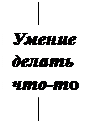 |
Главная |
быть каким-то быть каким-то
|
из
5.00
|
(характеристика) (состояние)
To be
 |
Быть где-то
|
PRESENT, PAST, FUTURE CONTINUOUS
Participle I
to be working
I ф.
| Past | Present | Future |
| was/were working | am/is are working | will be working |
| She was working in the office. | She is working in the office. | She will be working in the office. |
| Was she working in the office? | Is she working in the office? | Will she be working in the office? |
| She wasn’t working in the office. | She isn’t working in the office. | She won’t be working in the office. |
PAST, PRESENT, FUTURE PERFECT
III ф.
To have sent
| Past | Present | Future |
| had sent | have/has } sent | will have }sent |
| He had sent it. | He has sent it. | He will have sent it. |
| Had he sent it? | Has he sent it? | Will he have sent it? |
| He hadn’t sent it. | He hasn’t sent it. | He won’t have sent it. |
Present
 |
| Наличие в определенном месте чего-то (кого-то) одного | ||
| There was … | ||
| a shop | ||
| There is | some snow | in the lane. |
| a lot of light | ||
| There will be … | ||
| Was there … ? | ||
| a shop | ||
| Is there | any snow | in the lane? |
| much light | ||
| Will there be … ? | ||
| There was no … | ||
| no shop | ||
| There is | not any snow | In the lane. |
| not much light | ||
| There will be no … |
Present
| |||||||||
| |||||||||
 |  | ||||||||
| |||||||||
| Наличие в определенном месте чего-то (кого-то) одного | ||
| There were … | ||
| people | ||
| There are | some chairs | in the room. |
| a lot of flowers | ||
| There will be … | ||
| Were there … ? | ||
| people | ||
| Are there | any chairs | in the room? |
| many flowers | ||
| Will there be … ? | ||
| There were no … | ||
| no people | ||
| There are | not any chairs | in the room. |
| not many flowers | ||
| There will be no … |
|
|
| ||||||||||||||||||
 |  |  | ||||||||||||||||||
| ||||||||||||||||||||
|
| |||||||||||||||||||
 |  | |||||||||||||||||||
| could | can | to be able to |

| 
| 
|
| Could she run fast? | Can she run fast? | Will she be able to run fast? |
| Yes, she could (run fast). | Yes, she can (un fast). | Yes, she will (be able to run fast). |
| No, she couldn’t (run fast). | No, she cannot/can’t (run fast). | No, she won’t (be able to run fast). |
| возможность (зависит не от субъекта, а от условий, обстоятельств, складывающихся при выполнении действия) | |
| иметь возможность | |
| may | can |
| фактическая (возможность конкретного действия) | теоретическая (общие черты поведения) |
| мочь | быть свойственным |
| The flight may be delayed. | Everybody can be mistaken. |
| He may be at his office. | One can feel nervous. |
| предположение основанное на | |||
| неуверенности в совершении действия | малой вероятности совершения действия | ||
| I’m not sure. | I don’t think. | ||
| may | может быть | might | |
| He may have followed your advice. He may be sleeping. She may enter the Economy Department. | She might have translated the text. He might be doing the flat. He might still pass his exam. | ||
| предположение основанное на | ||
| уверенности в совершении действия (должно быть, наверное, вероятно) | ||
| Past | Present | Future |
| probably | must | probably (un)likely |
| Jack probably didn’t sign the contract. He probably didn’t go to the office. | Jack must sign the contract. He must be at the bank. | Jack is unlikely to sign the contract. She is likely to cry. Dad will probably go to the shop tomorrow. |
| Modal verbs | ||
| must должен | can (could) мочь | may (might) мочь |
| to have to | to be able to | to be allowed to |
| приходиться в силу сложившихся обстоятельств to be to приходиться по плану, по договоренности, по графику | уметь, быть в состоянии | разрешаться, позволяться |
| Формы выражения в | ||
| Past | Present | Future |
| could was/were able to | can am/is/are able to | will be able to |
| might was/were allowed to | may am/is/are allowed to | will be allowed to |
| had to (did …?) | must have/has to (do(does) …?) | will have to |
| эмоциональное состояние | |||
| недоумение, нетерпение, изумление | сомнение, удивление, невероятность | ||
| can | could | can | could |
| И что это …? | И что это …? | не может быть, чтобы | вряд ли, неужели |
| What can he imagine? | What could she be explaining to me? | Can she have told you a lie? | Could he know him? |
| упрек неодобрение | |||
| следовало бы/мог (ли) бы | |||
| ought | should | shouldn’t | might |
| You ought to have come long ago. | You should have come long ago. | You shouldn’t have done it. | You might work harder at your pronunciation. |
| просьба | |||
| вежливая форма | разговорная форма | официальная форма | фамильярная форма |
| could; would | can; will | may | can |
| Не могли бы Вы … | Передай мне … | Можно мне … | Не можете ли Вы … |
| Could you help me, please? Would you tell me the way to the nearest bank, please? | Can I take your umbrella? Will you pass me the salt, please? | May I speak to the chief? May I ask you a question? | Can’t you keep silent for a moment? Can’t you leave me alone? |
| ответ на просьбу | |||
| разрешение или отклонение просьбы | категорический запрет или строгое предупреждение | ||
| can | must not | ||
| Разреши(те) …? | Можно мне …? | ||
| Can I phone you in the morning? | May I have a smoke? | ||
| можно | нельзя | не должен | нельзя |
| Yes, you can. I’ll be waiting for your call. | No, you can’t. I’m sorry but I’ll be busy tomorrow. | No, you mustn’t smoke here. | No, you mustn’t smoke here. |
| Долженствование, устанавливаемое говорящим | |||||
| обязанность (должен, обязан) | осознанная необходимость (надо, необходимо) | настоятельный совет (нужно) | стремление получить распоряжение (мне делать …?) | приказание (должен) | нежелание выполнять действие, приказание (обязательно ли, с какой стати) |
| must | must | must | shall | must | Must I … Why should I … |
| I must go to work every day. | I must take care of my little sister. | All of you must visit the exhibition. | Shall I answer? Shall I do it now? | You must go there today. | Must I go there today? Why should I do it now? |
| Долженствование, устанавливаемое помимо воли говорящего | ||||
| вынужденность, назначеность, необходимость | вынужденность, назначеность, необходимость | вынужденность, назначеность, необходимость | рекомендация, личное мнение | совет, выражающий объективную необходимость |
| to have to | to have to | to have to=need | should | Ought to |
| приходится, вынужден | Когда мне …? (назначено) | не нужно, не приглашают | следует, следовало бы, должен был бы, нужно бы, посоветоваться бы | следует, следовало бы, должен был бы, нужно бы, посоветоваться бы |
| I have to stay after classes tomorrow. | When do I have to stay after classes? | You don’t have to stay after classes. = You needn’t stay … | He should read English every day. | You ought to play more attention to your grammar mistakes. |
|
из
5.00
|
Обсуждение в статье: быть каким-то быть каким-то |
|
Обсуждений еще не было, будьте первым... ↓↓↓ |
Популярное:
Как выбрать специалиста по управлению гостиницей: Понятно, что управление гостиницей невозможно без специальных знаний. Соответственно, важна квалификация...
Почему человек чувствует себя несчастным?: Для начала определим, что такое несчастье. Несчастьем мы будем считать психологическое состояние...
Личность ребенка как объект и субъект в образовательной технологии: В настоящее время в России идет становление новой системы образования, ориентированного на вхождение...

©2015-2024 megaobuchalka.ru Все материалы представленные на сайте исключительно с целью ознакомления читателями и не преследуют коммерческих целей или нарушение авторских прав. (297)
Почему 1285321 студент выбрали МегаОбучалку...
Система поиска информации
Мобильная версия сайта
Удобная навигация
Нет шокирующей рекламы

